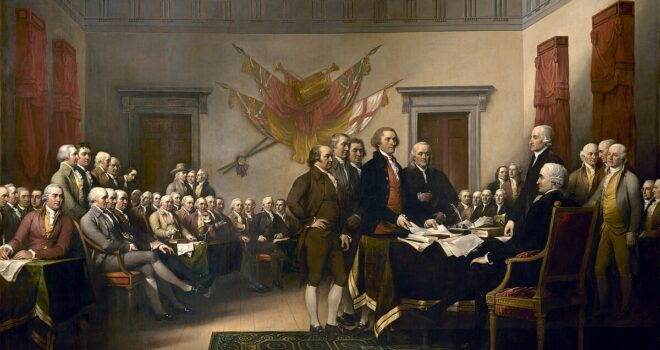Independence Day in America is a secular holiday celebrating freedom with picnics, fireworks, parades, and the proud display of the American flag. For Christians, Independence Day means even more, for by the signing of the Declaration of Independence a series of events ensued that shaped Christianity in America from 1776 until today. For Roman Catholics, Independence Day means the freedom to worship in America, which allows Catholics the opportunity to spread the truth of Christianity to all people in North America and beyond, thus fulfilling, ultimately, Jesus’s command to His disciples, as quoted by the Apostle Mark, “Go into all the world and preach the gospel to the whole creation.”
One of the signers of the Declaration of Independence was Roman Catholic Charles Carroll of Carrollton, Maryland, who, like all Catholics in the thirteen British-American colonies, was persecuted for his beliefs. Carroll, however, believed in the promise of America: that constitutional safeguards would protect liberty by limiting popular rule, suppress vice and promote virtue, and restrain political passions with a focus on reason.
His cousin John Carroll had also grown up in Maryland, experiencing the same restrictions on Roman Catholics; after years of education in Europe, he returned to Maryland during the revolutionary crisis. In 1776, John joined his cousin Charles (as well as Benjamin Franklin) in an unsuccessful diplomatic expedition to Canada to try to convince the Catholics of Quebec to join the American cause.
John Carroll was a Jesuit who lived at a time when Pope Clement XIV had suppressed the Jesuits; thus, Carroll lived through the war by keeping his head down as both a Jesuit and Catholic.
During the war, the Vicar Apostolic of London had ostensible authority over American Catholics. The Vatican, responding to John Carroll and other Catholics at the end of the war who had requested a new authority over American Catholics, appointed Father John Carroll Superior of the Missions. At the war’s end, Father Carroll faced this question: how are Catholics, suppressed during the colonial period, able to exercise their rights and freedoms in an independent United States of America?
The freedom to exercise the same rights as other Americans while also fulfilling the Great Commission to spread Christianity throughout North America inspired Father Carroll in 1784 to write a book, Address to the Roman Catholics of the United States of America. In responding to attacks by American Protestants on Roman Catholics, Father John Carroll’s remarks shed light on how Roman Catholics viewed Independence.
Father Carroll argued that Protestants incorrectly assume that Roman Catholics are authoritarian and unable to accept other people who do not embrace the Catholic way. Rather, “the members of the catholic church are all those, who with a sincere heart seek true religion, and are in an unfeigned disposition to embrace the truth, whenever they find it.” He quoted the authority of St. Thomas Aquinas, “that even they, to whom the gospel was never announced, will be excused from the sin of infidelity…If any of them conduct themselves in the best manner they are able…God will provide for them in his mercy.” Carroll elaborated that humans must conform to the “laws of nature” (echoing the Declaration of Independence) “and directions of right reason.” Roman Catholics are therefore joined to other American seekers of religious truth.
The Declaration of Independence proclaims arguments according to reason that are “self-evident” truths. Father Carroll used the same approach in his book, showing the rationale for the emphasis of Roman Catholics on the apostolic tradition: each priest receives from Christ “the same commission of teaching, and administering the sacraments.” The church “cannot exist without preaching of the gospel;” hence, the infallible doctrines are continuously provided for all people. “No books, no erudition is here necessary. The illiterate, as well as learned Christian can easily be certified of the fact, on which the reasoning is founded.”
The Declaration of Independence is written for a rational people. Father Carroll expressed his view of the devotion of Catholics to an America “blessed with civil and religious liberty.” Americans, he believed, have “the wisdom and temper to preserve” this liberty such that “America may come to exhibit a proof to the world, that general and equal toleration, by giving a free circulation to fair argument, is the most effectual method to bring all denominations of Christians to an unity of faith.”
Independence Day to such a person as Father John Carroll is a symbol of God’s providential care for a people who are willing to join together in pursuit of God’s truth, and upon acquiring a working knowledge of said truth, to implement it in government, society, and culture to promote freedom of conscience, confident that inquiring people shall know the truth, and the truth shall set them free.
Trumbull, J. (1819). Declaration of Independence [painting]. Retrieved from Wikimedia Commons.










